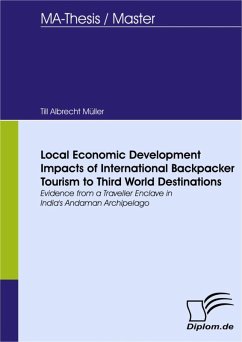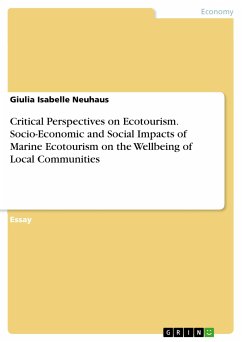Inhaltsangabe:Introduction: In the past two decades backpacker tourism has grown vastly throughout both developed and developing world. Particularly to south and Southeast Asian countries the phenomenon of backpacking is not new, so to India, where it dates back to the 60¿s and 70¿s hippy drifters, to which backpacking is often associated. It has been since the publication of the Lonely Planet¿s ¿Yellow Bible¿ (¿Southeast Asia on a Shoestring¿) in 1975 that backpacking has gradually emerged as a mass travel style. Today popular travel-yourself literature cover almost every corner of the globe, serving a steady demand for ¿off the beaten path¿ travel. Thereby to backpackers the developmental background of a destination plays a lesser role than to the mainstream tourist, who is demanding certain infrastructural arrangements. As a result backpackers are found in utmost remote and low developed locations that other tourists never reach. Thus backpacker enclaves have emerged in many places throughout the world, and not without effects on their hosting environments. While social impacts often carry negative connotations, hosting communities do usually appreciate backpackers for their economic contributions. Objectives and Scope of this paper: In recent years backpacker tourism has profoundly been studied in developed contexts, particularly Australia and New Zealand are to be seen the pioneering regions of independent travel research, having undertaken strenuous efforts to study the same within the past two decades. As a consequence both destinations have recognized the economic value of low budget travel to their countries and established backpacker tourism as high yielding segments within their national tourism markets. In both countries backpacking has since undergone shift from de-marketing to a marketing label. Though in recent years international research has made numerous successful attempts to study backpacker tourism in less developed contexts, many tourism officials in third world destinations as yet refuse to accept the economic reach coming along with low-budget travel. Instead a majority of administrative instances promote upscale- and regulated forms of tourism to be the way forward, neglecting any concerns with regard to necessary infrastructure or initial investments. Though only a fraction of developing nations do actively restrict independent travel to their territories (e.g. Maldives, Bhutan), a majority at best tacitly ignores the [...]
Dieser Download kann aus rechtlichen Gründen nur mit Rechnungsadresse in A, B, BG, CY, CZ, D, DK, EW, E, FIN, F, GR, HR, H, IRL, I, LT, L, LR, M, NL, PL, P, R, S, SLO, SK ausgeliefert werden.









